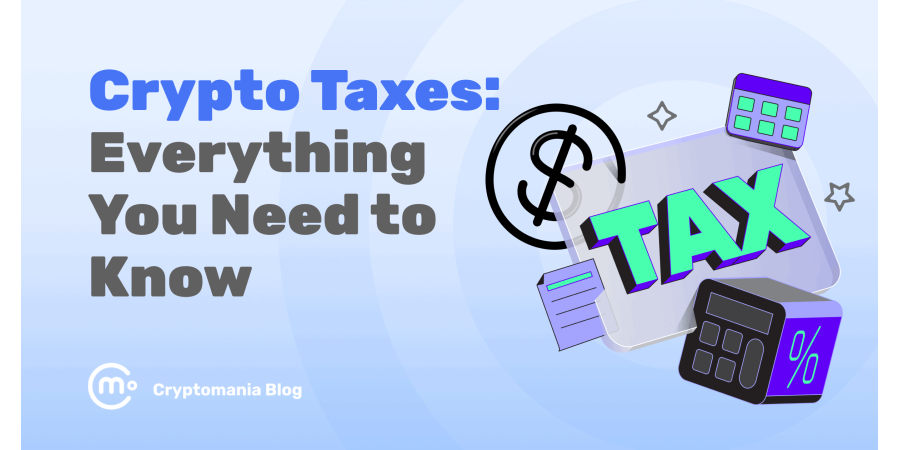

Crypto is growing mainstream. It’s not a fringe thing anymore. And governments around the world are starting to notice.
In 2025, we’re seeing real change:
- Tax agencies are tightening the rules
- Exchanges are being pushed to share more data
- Industry watchdogs are raising compliance radar higher than ever
The aim of this article is simple: we’re here to break it down for you. You’ll learn how crypto taxes work, what it takes to stay compliant, and legal ways to reduce your tax bill, without ever crossing the line into evasion.
Let’s get started!
Crypto tax basics: what are the taxes on crypto gains and how do they work?
Think of crypto the same way tax offices think of stocks or real estate. If you make money from it, they want their share.
In most countries, crypto is treated as property or an asset, not like regular currency. That means when you sell or trade it at a profit, you create a capital gain. And capital gains are taxable.
Here’s the simple formula:
Selling price – purchase price = taxable gain (or loss)
For example, if you bought 1 ETH for $1,000 and later sold it for $1,500, that $500 profit is what you’ll be taxed on. If you sold it for $800 instead, you’d have a $200 loss. Sometimes those losses can help reduce your overall tax bill.
But gains aren’t the only thing you need to stay on top of:
- Earning crypto (through mining, staking, airdrops, or even getting paid in Bitcoin) is usually taxed as income, based on its value when you receive it
- Holding crypto without selling it? That’s not a taxable event. Your portfolio can go up or down in value all year, but until you sell, swap, or spend it, there’s nothing to report
This is the foundation of how crypto taxes work everywhere, even though each country has its own specific rates and rules.
Let’s take a look at the details.
Taxable events VS non-taxable events: how do taxes work on crypto
When it comes to crypto taxes, the biggest question is: what actually triggers a tax bill? Not everything you do with crypto counts. Some actions are taxable, others are not.
Taxable events (where taxes apply)
These are the moments when governments usually want you to pay up:
- Selling crypto for fiat currency. Example: You sell Bitcoin for U.S. dollars, euros, or rupees. If you sold it for more than you paid, that profit is taxable.
- Trading one crypto for another. Swapping ETH for SOL or BTC for USDT? Even though no cash is involved, tax authorities treat it as if you sold one asset and bought another.
- Spending crypto on goods or services. Buying coffee with Bitcoin or paying for flights with USDT is considered a sale. If the crypto you spent had gained value since you bought it, the difference counts as taxable gain.
- Earning crypto. Mining, staking rewards, yield farming payouts, airdrops, or getting paid in Bitcoin for work – all of these are treated as income. The taxable amount is the fair market value at the time you received it.
Non-taxable events (where no taxes apply)
There are plenty of crypto actions that don’t trigger taxes:
- Buying and holding. Just purchasing Bitcoin or ETH and leaving it in your wallet does nothing tax-wise until you sell or use it.
- Transferring between your own wallets. Moving coins from Binance to a cold wallet, or from MetaMask to Ledger, isn’t a taxable event.
- Receiving a gift. If someone gifts you crypto, in most countries you don’t pay tax until you eventually sell it. (Though the gift giver may face gift tax, depending on local laws.)
- Donations. Donating crypto to a registered charity may even give you tax benefits in some jurisdictions, rather than triggering a liability.
Takeaway
- If you dispose of crypto (sell, trade, or spend) or earn it, there’s likely a tax impact.
- If you simply hold it or move it around within your own accounts, there’s not.
This simple split is the foundation for understanding how crypto taxes work globally.
How to report crypto on taxes?
Let’s talk about an important question: How do you report crypto on taxes?
The rules vary, but the goal is the same. Tell the tax office when you earn, sell, or trade crypto, so you stay compliant. Here’s a clear breakdown.
Global rules that apply almost everywhere
- Keep good records. Save dates, amounts, values in your local currency, and type of transaction (sell, trade, earn). You’ll need this regardless of where you’re based.
- Declare gains and income. If you made profits, swapped coins, or earned crypto, most countries want those reported, either as capital gains or income.
- Expect data sharing. Many countries and platforms are now connected through frameworks like the OECD’s Crypto‑Asset Reporting Framework (CARF). This means exchanges will report your activity to your local tax agency. And authorities share that info internationally.
Country examples
United States
- The IRS treats crypto gains like capital gains. You report each sale or trade on Form 8949, summarize totals on Schedule D, and file income from crypto earnings (like mining/staking) on Form 1040.
- Starting in 2025, U.S. crypto platforms must also file Form 1099‑DA, which tracks digital asset sales. It means your data is already visible to the IRS.
United Kingdom
- Crypto is taxed under Capital Gains Tax (CGT) rules. HMRC expects you to track gains and declare them on your Self Assessment tax return.
- Every tax year, you get a CGT allowance. This is the amount of gains you can make before paying tax. For 2025/26, that allowance is £3,000. If your total crypto gains stay under that threshold, no CGT is due (though you may still need to report the activity).
- Expect new reporting rules soon, backed by the EU’s DAC8 framework, part of the broader CARF initiative. This means tax authorities will receive more data from exchanges starting in 2026.
Germany
- Crypto is treated as a private asset. If you sell after holding for over one year, gains are tax-free.
- If you sell within a year, the profit is taxed as part of your personal income. But there’s a small cushion: up to €1,000 per year in short-term private sale gains are exempt. If your gains are under that threshold, you don’t pay tax. Once you cross it, your regular income tax rate (14%–45%) applies.
India
- India has one of the strictest crypto tax regimes. All gains from crypto or NFTs fall under the Virtual Digital Asset (VDA) framework. The headline rules:
- A flat 30% tax on profits.
- A 1% TDS (tax deducted at source) on every transfer.
- No expenses (except cost of acquisition) can be deducted, and losses cannot be set off against other income. That means even if you lost money on one token, it can’t reduce the tax you owe on another.
- The flat 30% applies no matter how much you earned, but the 1% TDS hits every transfer, even small ones. You must report all trading gains and any crypto income (like staking or airdrops) each year in your income tax return.
Russia
- Starting 2025, crypto is officially defined as property. Individuals face 13% tax on crypto income up to 2.4 million RUB (~$22k), and 15% on amounts above that.
- You must report crypto transactions if your activity exceeds 600,000 RUB per year. Fines of up to 40% of unpaid tax apply for non-reporting.
- Roughly 70% of miners remain unregistered. This suggests enforcement is still catching up. But registration and reporting are legally required.
China
- Officially, crypto trading and mining are banned within mainland China. Still, the tax agency monitors digital asset activity closely.
- Recent guidance treats crypto as a virtual asset. Profits are taxed at 20% as capital gains. Crypto income (mining or payments) is treated as regular income, and tax can range from 3% to 45% for individuals, based on yearly earnings.
- Penalties are harsh. Non-compliance may incur fines starting at 50% of unpaid tax and rising to 500% for deliberate evasion. Prison is a risk too.
TL;DR
| Country | What to Report | Key Rates & Notes |
| Global | Sell, trade, earn | Keep records. CARF may share your data internationally |
| USA | Gains on Form 8949/Schedule D; income | New Form 1099-DA shows IRS your trades |
| UK | Self Assessment CGT section | DAC8 will bolster reporting from 2026 |
| Germany | Short-term gains (under 1 year) | Over 1 year = tax-free |
| India | Gains + crypto income | Flat 30%; 1% TDS applies |
| Russia | Transactions over 600k RUB | 13–15% tax; serious penalties if you skip reporting |
| China | Crypto gains/income (despite ban) |
20% CGT; up to 45% income tax; major fines for evasion |
Key takeaway
Wherever you are, report your crypto activity truthfully and keep detailed records.
Tax authorities increasingly get data from exchanges, and international rules like CARF make it harder to hide. Compliance protects you.
Plus, it helps legitimize the whole crypto space.
Calculating crypto taxes for free (and tools to help)
Once you know which crypto events are taxable, the next step is to figure out how much you owe.
This can feel intimidating at first. But the math is actually pretty straightforward if you break it down.
How to calculate crypto taxes
Let’s reiterate the basic idea:
Sale price – purchase price = gain (or loss)
Example:
- You bought 0.5 BTC for $20,000.
- You later sold it for $30,000.
- Your gain = $10,000.
That $10,000 is taxable according to your country’s rules. If instead you sold it for $15,000, you’d have a $5,000 loss. This can sometimes reduce your overall tax bill by offsetting other gains.
But there are a few wrinkles:
- If you sell parts of a larger holding, you need to decide which “unit” you sold. Some tax systems use FIFO (first in, first out), others allow LIFO (last in, first out) or other accounting methods.
- Income in crypto (from staking or mining) is usually taxed based on the fair market value in your local currency the day you received it.
Why this gets complicated
If you trade frequently or use multiple exchanges, tracking cost basis (what you paid for each piece of crypto) becomes really messy.
Imagine dozens or hundreds of trades. You don’t want to calculate all that by hand.
That’s where tools come in.
Free tools to calculate crypto taxes
Fortunately, there are platforms that can help:
- CoinLedger Free Tax Calculator: Lets you plug in your trades and instantly estimate how much tax you owe.
- Koinly Free Plan: Generates capital gains reports for up to a limited number of transactions before you need a paid plan.
- Exchanges’ own reports: Many big exchanges (like Coinbase, Binance, and Kraken) now offer downloadable transaction histories or even pre-filled tax reports you can use.
These free calculators won’t always replace a full report (especially if you’re a high-volume trader), but they’re great for getting an estimate quickly.
How much are taxes on crypto: calculating fast examples
- U.S.: You bought 1 ETH for $2,000 and sold it a year later for $3,500. That’s a $1,500 long-term capital gain. If you’re in the 15% LTCG bracket, tax ≈ $225 (and possibly NIIT if your income is high).
- UK: You made £5,000 total crypto gains in 2025/26, with no other gains. Subtract the £3,000 allowance → £2,000 taxable. If you’re a basic-rate taxpayer, CGT at 18% ≈ £360.
- Germany: You held BTC for >12 months and sold for a profit. €0 tax (private sale, long-term). If you sold within 12 months and your total private-sale profits for the year are €900, that’s under €1,000 → €0 tax for the year. Above €1,000, normal income tax rates apply.
- India: You gained ₹100,000 on a crypto sale. Tax is a flat 30% = ₹30,000 (+ surcharge/cess). Expenses (other than cost basis) are not deductible. Losses cannot be set off. Also remember 1% TDS at the time of transfer.
- Russia: You realized ₽1,000,000 in crypto gains in 2025. Those gains are included in your PIT base; tax applies at your progressive PIT rate (e.g., 13% in the lowest bracket, higher bands for higher total income).
- China (Mainland): Trading is illegal, so there’s no compliant way to realize and report gains from domestic trading
How to minimize crypto taxes legally
You can’t avoid taxes on crypto, but you can reduce them legally.
- The main strategy is holding long-term. In places like the U.S. and Germany, gains after 12 months get lower (or even zero) tax rates.
- Another tool is tax-loss harvesting. If some coins are down, selling them can offset gains from other trades. Many tax systems let you carry forward unused losses to future years.
- Timing also matters. Selling across different tax years, or when your income is lower, can sometimes keep you in a lower bracket.
- Finally, make sure to use any allowances or exemptions your country offers. Some examples include the UK’s £3,000 CGT allowance or Germany’s €1,000 threshold.
These are all legal ways to reduce your bill. Trying to avoid taxes on crypto altogether is tax evasion, and the risks are not worth it.
What happens if I don’t report crypto on taxes?
Skipping crypto taxes is tax evasion, plain and simple. It’s not a harmless shortcut.
And in 2025, authorities worldwide are cracking down hard.
- Fines and penalties: At a minimum, you’ll face back taxes, interest, and penalties that can add up quickly. In the U.S., fraud penalties can reach 75% of the unpaid tax, and in some cases, up to 5 years in prison. Many other countries, including India, Germany, and China, have similarly strict penalties.
- Data sharing: Exchanges now report user activity to governments. In the U.S., new 1099-DA forms make every digital asset sale visible to the IRS. Europe and the UK are joining frameworks like DAC8 and the OECD’s CARF, which share crypto transaction data across borders.
- Reputation risk: Once flagged, you may face more audits in the future. This can go way beyond crypto.
We’ll make it as simple and plain as possible:
Trying to avoid reporting taxes isn’t worth the risk.





